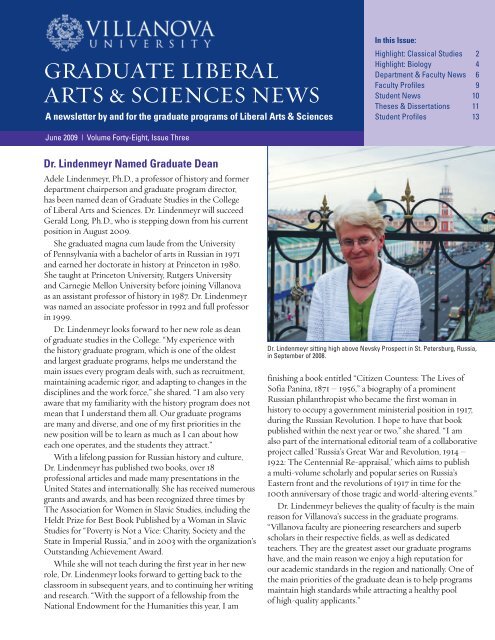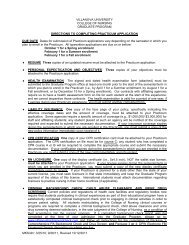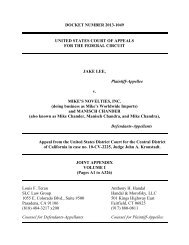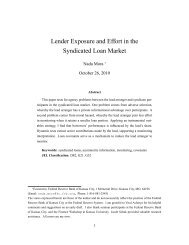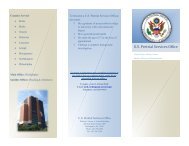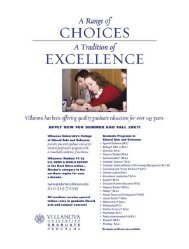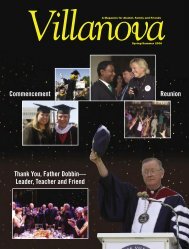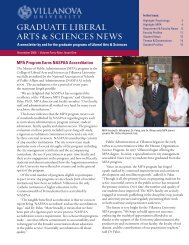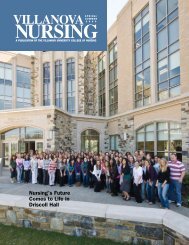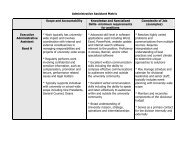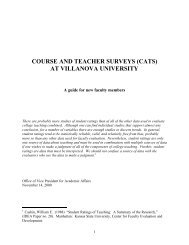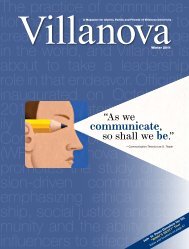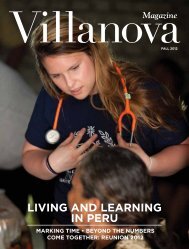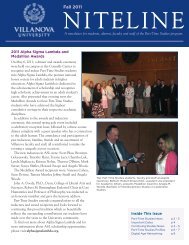graduate liberal arts & sciences news - Villanova University
graduate liberal arts & sciences news - Villanova University
graduate liberal arts & sciences news - Villanova University
You also want an ePaper? Increase the reach of your titles
YUMPU automatically turns print PDFs into web optimized ePapers that Google loves.
GRADUATE LIBERAL<br />
ARTS & SCIENCES NEWS<br />
A <strong>news</strong>letter by and for the <strong>graduate</strong> programs of Liberal Arts & Sciences<br />
In this Issue:<br />
Highlight: Classical Studies 2<br />
Highlight: Biology 4<br />
Department & Faculty News 6<br />
Faculty Profiles 9<br />
Student News 10<br />
Theses & Dissertations 11<br />
Student Profiles 13<br />
June 2009 | Volume Forty-Eight, Issue Three<br />
Dr. Lindenmeyr Named Graduate Dean<br />
Adele Lindenmeyr, Ph.D., a professor of history and former<br />
department chairperson and <strong>graduate</strong> program director,<br />
has been named dean of Graduate Studies in the College<br />
of Liberal Arts and Sciences. Dr. Lindenmeyr will succeed<br />
Gerald Long, Ph.D., who is stepping down from his current<br />
position in August 2009.<br />
She <strong>graduate</strong>d magna cum laude from the <strong>University</strong><br />
of Pennsylvania with a bachelor of <strong>arts</strong> in Russian in 1971<br />
and earned her doctorate in history at Princeton in 1980.<br />
She taught at Princeton <strong>University</strong>, Rutgers <strong>University</strong><br />
and Carnegie Mellon <strong>University</strong> before joining <strong>Villanova</strong><br />
as an assistant professor of history in 1987. Dr. Lindenmeyr<br />
was named an associate professor in 1992 and full professor<br />
in 1999.<br />
Dr. Lindenmeyr looks forward to her new role as dean<br />
of <strong>graduate</strong> studies in the College. “My experience with<br />
the history <strong>graduate</strong> program, which is one of the oldest<br />
and largest <strong>graduate</strong> programs, helps me understand the<br />
main issues every program deals with, such as recruitment,<br />
maintaining academic rigor, and adapting to changes in the<br />
disciplines and the work force,” she shared. “I am also very<br />
aware that my familiarity with the history program does not<br />
mean that I understand them all. Our <strong>graduate</strong> programs<br />
are many and diverse, and one of my first priorities in the<br />
new position will be to learn as much as I can about how<br />
each one operates, and the students they attract.”<br />
With a lifelong passion for Russian history and culture,<br />
Dr. Lindenmeyr has published two books, over 18<br />
professional articles and made many presentations in the<br />
United States and internationally. She has received numerous<br />
grants and awards, and has been recognized three times by<br />
The Association for Women in Slavic Studies, including the<br />
Heldt Prize for Best Book Published by a Woman in Slavic<br />
Studies for “Poverty is Not a Vice: Charity, Society and the<br />
State in Imperial Russia,” and in 2003 with the organization’s<br />
Outstanding Achievement Award.<br />
While she will not teach during the first year in her new<br />
role, Dr. Lindenmeyr looks forward to getting back to the<br />
classroom in subsequent years, and to continuing her writing<br />
and research. “With the support of a fellowship from the<br />
National Endowment for the Humanities this year, I am<br />
Dr. Lindenmeyr sitting high above Nevsky Prospect in St. Petersburg, Russia,<br />
in September of 2008.<br />
finishing a book entitled “Citizen Countess: The Lives of<br />
Sofia Panina, 1871 – 1956,” a biography of a prominent<br />
Russian philanthropist who became the first woman in<br />
history to occupy a government ministerial position in 1917,<br />
during the Russian Revolution. I hope to have that book<br />
published within the next year or two,” she shared. “I am<br />
also part of the international editorial team of a collaborative<br />
project called ‘Russia’s Great War and Revolution, 1914 –<br />
1922: The Centennial Re-appraisal,’ which aims to publish<br />
a multi-volume scholarly and popular series on Russia’s<br />
Eastern front and the revolutions of 1917 in time for the<br />
100th anniversary of those tragic and world-altering events.”<br />
Dr. Lindenmeyr believes the quality of faculty is the main<br />
reason for <strong>Villanova</strong>’s success in the <strong>graduate</strong> programs.<br />
“<strong>Villanova</strong> faculty are pioneering researchers and superb<br />
scholars in their respective fields, as well as dedicated<br />
teachers. They are the greatest asset our <strong>graduate</strong> programs<br />
have, and the main reason we enjoy a high reputation for<br />
our academic standards in the region and nationally. One of<br />
the main priorities of the <strong>graduate</strong> dean is to help programs<br />
maintain high standards while attracting a healthy pool<br />
of high-quality applicants.”
Highlight:<br />
CLASSICAL STUDIES<br />
“Changes of Form, New Shapes”<br />
Enhance Classics Program<br />
This Year<br />
This spring’s hit campus production of<br />
a play based on Ovid’s “Metamorphoses”<br />
epitomized the dramatic changes<br />
undergone this year in the classics<br />
program. In a year characterized by<br />
the Roman poet’s theme of “changes<br />
of form, new shapes,” the program<br />
welcomed a new chair, a new director<br />
of Graduate Studies, two new classics<br />
professors, and three new affiliated<br />
faculty to its ranks. The additional<br />
faculty broadened the program’s range<br />
of offerings to include such fields as<br />
ancient history and philosophy, classical<br />
political thought, and Greek and Roman<br />
archaeology. Plans are also underway to<br />
teach Greek literature more regularly, to<br />
offer students more experience honing<br />
their research and writing skills, and to<br />
create stronger bonds between the<br />
<strong>graduate</strong> and under<strong>graduate</strong> classics<br />
programs.<br />
The <strong>graduate</strong> program is proud to<br />
announce that three students <strong>graduate</strong>d<br />
this spring: Joanna Johnson; Laura<br />
Malone, the first student enrolled in<br />
the five-year Bachelor/Master’s degree<br />
program; and Stephen Parker, who<br />
passed his comprehensive exams with<br />
Honors. These students completed the<br />
Herculean task of taking three threehour<br />
exams in Latin translation, the<br />
history of Latin literature, and Roman<br />
From left to right: Graduate students Steven Ciprani, Stephen McGrath, and Thomas Di Giulio visit with<br />
preeminent Latinist Dr. Denis Feeney (center) at a tea hosted by Dr. David Califf (far right).<br />
history! To aid them in their labors, they<br />
were given a list of topics and texts to<br />
study that will be distributed to other<br />
students this summer. Parker, a full-time<br />
editor, expressed his appreciation for the<br />
opportunity to take evening classes with<br />
passionate, knowledgeable professors, a<br />
sentiment shared by his colleagues James<br />
Fiorile and Edward Turner, who are fulltime<br />
teachers.<br />
Two new five-year B.A./M.A. students,<br />
William Blubaugh and Rhodes Pinto,<br />
will be starting the program this fall.<br />
The year began with two events<br />
that not only brought the entire classics<br />
program together but also attracted<br />
the attention of the entire <strong>University</strong><br />
community. The first was a reception<br />
attended by <strong>graduate</strong> and under<strong>graduate</strong><br />
students, faculty, and <strong>University</strong><br />
administrators (see photo on page 3).<br />
The second was a public reading of<br />
Homer’s “Odyssey,” which was attended<br />
by hundreds of people in the course of<br />
a fifteen-hour marathon! (For details,<br />
see the November – December 2008<br />
<strong>news</strong>letter.)<br />
A New Chair and Two New<br />
Professors Join the Program<br />
Kevin Hughes, Ph.D., succeeded Thomas<br />
Smith, Ph.D., as chair of the Humanities<br />
Department and Classics Program,<br />
when Dr. Smith became associate dean<br />
for Humanities in the College of Arts<br />
and Sciences. Dr. Hughes, who has been<br />
teaching at <strong>Villanova</strong> since 1997, is also<br />
an associate professor of Theology and<br />
Religious Studies specializing in Late<br />
Antique and Medieval Latin Literature.<br />
He is the author of “Constructing<br />
Antichrist: Paul, Biblical Commentary,<br />
and the Development of Doctrine in the<br />
Early Middle Ages” (Catholic <strong>University</strong><br />
of America Press, 2005).<br />
Gary Meltzer, Ph.D., who has been<br />
teaching at <strong>Villanova</strong> since 2005,<br />
became the new director of Graduate<br />
Studies and associate professor of<br />
Classics. The author of “Euripides and<br />
the Poetics of Nostalgia” (Cambridge<br />
<strong>University</strong> Press, 2006), he taught a<br />
<strong>graduate</strong> seminar on Euripides last fall<br />
and will be offering one on Homer next<br />
fall. He is currently working on a second<br />
book about the relevance of the classics<br />
to contemporary life. This spring<br />
Dr. Meltzer took a group of students<br />
2 •
to the <strong>University</strong> of Pennsylvania to hear<br />
a lecture on ancient magic.<br />
Valentina DeNardis, Ph.D., assistant<br />
professor of Classics, specializes in Latin<br />
Poetry and Greek and Roman Material<br />
Culture. This year she delivered a paper<br />
on ancient astronomy in Glasgow,<br />
Scotland and has another paper<br />
forthcoming in “Jesuit Education<br />
and the Classics” (Cambridge Scholars<br />
Publishing, 2009). Dr. DeNardis, who<br />
is looking forward to teaching Roman<br />
elegy and classical archaeology in the<br />
program, is also organizing a meeting<br />
of the Pennsylvania Classical<br />
Association to take place at <strong>Villanova</strong><br />
in February 2010.<br />
New Affiliate Faculty Members<br />
Christopher Haas, Ph.D., associate<br />
professor of History and Classical<br />
Studies, specializes in ancient history,<br />
late antiquity, and early Christianity. The<br />
author of “Alexandria in Late Antiquity:<br />
Topography and Social Conflict” (Johns<br />
Hopkins <strong>University</strong> Press, 1997), Dr.<br />
Haas taught a course on Late Antiquity<br />
that proved popular with this year’s<br />
cohort of classicists.<br />
Mark Shiffman, Ph.D., assistant<br />
professor of Humanities, specializes in<br />
Greek philosophy and political theory.<br />
His translation of Aristotle’s “On the<br />
Soul” is forthcoming with Focus Press.<br />
He is currently working on a book on<br />
Plutarch’s political philosophy, a topic<br />
on which he published an article in the<br />
journal Perspectives on Political Science.<br />
Thomas Smith, Ph.D., associate dean<br />
for Humanities and associate professor<br />
of Political Science, specializes in<br />
Classical Political Thought. He has<br />
published a book, “Revaluing Ethics”<br />
(SUNY Press, 2001), as well as<br />
numerous articles on the political<br />
theory of Plato, Aristotle and Augustine.<br />
Dr. Smith has won several awards for<br />
distinguished teaching at <strong>Villanova</strong>.<br />
Two longtime <strong>Villanova</strong> classics<br />
instructors continued to provide<br />
yeoman duty to the program, enhancing<br />
students’ educational experience both<br />
in and outside of the classroom:<br />
David Califf, Ph.D., who taught Latin<br />
Prose Composition this spring, invited<br />
his class to attend a tea he hosted in<br />
honor of Denis Feeney, Ph.D., Giger<br />
Professor of Latin and chair of Classics<br />
at Princeton <strong>University</strong>. Dr. Feeney, a<br />
preeminent scholar of Latin poetry,<br />
spoke with <strong>graduate</strong> students Steven<br />
Ciprani, Thomas Di Giulio, and<br />
Stephen McGrath about both<br />
academic and professional matters<br />
(see photo on page 2).<br />
James Finn, Ph.D., who taught<br />
Roman History, Comedy, and Lyric<br />
Poetry this year, will be presenting a<br />
paper on Cicero at the June meeting<br />
of the American Classical League in<br />
Los Angeles: “Cicero, Matius, and<br />
the Ides of March.” An inveterate<br />
Ciceronian, he is looking forward to<br />
teaching a course on Latin Rhetorical<br />
Works in the fall.<br />
For additional information about<br />
the Classics program please visit<br />
www.villanova.edu/<strong>arts</strong>ci/classical<br />
In Memoriam: John M. Hunt<br />
Sadly, the beginning of the academic<br />
year also saw the untimely death of<br />
John M. Hunt, Ph.D., a member of the<br />
<strong>Villanova</strong> faculty for nearly forty years<br />
and a renowned textual critic of Latin<br />
literature. Dr. Hunt served for several<br />
years as chair of Classical Studies<br />
before becoming director of Graduate<br />
Studies in 1997, a position he held<br />
until shortly before his death on<br />
October 8, 2008. He inspired many<br />
students with his passionate<br />
commitment to the field and his<br />
personal concern for their progress.<br />
A memorial service was held for him<br />
at the Corr Chapel on November 18.<br />
Graduate students Steven<br />
Ciprani (on left) and David<br />
Trachtenberg at the fall<br />
<strong>graduate</strong> school reception.<br />
• 3
Highlight:<br />
GRADUATE BIOLOGY<br />
Dr. Samantha Chapman examines mangrove biodiversity at Twin Cays, a group of small islands near the crest of the barrier reef of Belize, Central America.<br />
Like the discipline itself, <strong>Villanova</strong>’s<br />
department of Biology is dynamic —<br />
growing and changing to incorporate the<br />
latest advances in all areas of the life<br />
<strong>sciences</strong>. Through its research<br />
opportunities and degree and certificate<br />
programs, the department of Biology<br />
provides <strong>graduate</strong> training across the<br />
broad spectrum of the biological<br />
<strong>sciences</strong>. The 25 faculty members and<br />
postdoctoral fellows in the department<br />
interact with about 50 <strong>graduate</strong> students<br />
in the classroom and lab every semester.<br />
The department offers both master of<br />
<strong>arts</strong> and master of science degrees, as<br />
4 •<br />
well as several certificate programs in<br />
the broad areas of Cell, Molecular, and<br />
Developmental Biology and Ecology,<br />
Evolution, and Organismal Biology. In<br />
addition, the combined B.S./M.S.<br />
program in Biology offers a researchintensive<br />
course of study for highly<br />
motivated incoming under<strong>graduate</strong>s<br />
who wish to complete both degrees in<br />
just five years.<br />
Success of Our Graduates<br />
More than 50 students have earned<br />
their master’s degree in Biology over the<br />
last five years, about half through the<br />
research-intensive master of science<br />
program. A large number of both fulland<br />
part-time <strong>graduate</strong> students are<br />
actively engaged in thesis research.<br />
Graduates regularly go on to positions of<br />
prominence in their discipline, often<br />
pursuing research careers in academia or<br />
industry. Former students include<br />
Patricia Melloy, M.S. 1997, who<br />
completed her doctorate at the<br />
<strong>University</strong> of Pennsylvania and<br />
postdoctoral training at Princeton<br />
<strong>University</strong> and has now taken a faculty<br />
position in Biology at Farleigh<br />
Dickinson <strong>University</strong>; and Lesley<br />
Bechtold, M.S. 1996, who is now the
manager of the Histopathology and<br />
Microscopy Center at The Jackson<br />
Laboratory in Bar Harbor, Maine.<br />
New Faculty Research<br />
<strong>Villanova</strong> Biology faculty are the<br />
epitome of teacher-scholars, performing<br />
cutting-edge research that involves<br />
students and brings currency to the<br />
classroom. Recently hired faculty bring<br />
new areas of research interest and<br />
expertise to campus.<br />
Dennis Wykoff, Ph.D., a molecular<br />
geneticist, joined the faculty in fall<br />
2006. He received his doctorate at<br />
Stanford <strong>University</strong> and was a<br />
postdoctoral fellow at the <strong>University</strong> of<br />
California, San Francisco and Harvard<br />
<strong>University</strong> before arriving at <strong>Villanova</strong>.<br />
In 2008, he received a major three-year<br />
grant from the National Science<br />
Foundation entitled “Evolution of the<br />
phosphate starvation response in yeasts.”<br />
This grant funds Dr. Wykoff and<br />
students in their investigations of how a<br />
simple response to phosphate starvation<br />
has changed in yeast species that last<br />
shared a common ancestor more than<br />
100 million years ago. This basic<br />
research should help us to understand<br />
how different species tailor their genetic<br />
composition to their specific<br />
environment.<br />
Samantha Chapman, Ph.D., is an<br />
ecosystem ecologist who does research<br />
in tropical and temperate natural<br />
ecosystems and managed<br />
agroecosystems. Dr. Chapman received<br />
her doctorate from Northern Arizona<br />
<strong>University</strong> and did a postdoctoral<br />
fellowship at the Smithsonian<br />
Environmental Research Center,<br />
arriving at <strong>Villanova</strong> in fall 2007. Her<br />
current research in mangrove<br />
ecosystems and Southern Appalachian<br />
forests focuses on how plant biodiversity<br />
and land management influence<br />
ecosystem services such as carbon and<br />
nutrient cycling. She mentors <strong>graduate</strong><br />
and under<strong>graduate</strong> students working on<br />
a wide range of research projects such as<br />
investigating the impacts of biodiversity<br />
on invasive species and examining the<br />
migration of plant species in response to<br />
climate change.<br />
James W. Wilson, Ph.D., joined the<br />
Biology department in the summer of<br />
2008. He obtained his doctorate from<br />
Columbia <strong>University</strong> in the department<br />
of Microbiology and performed<br />
postdoctoral research at Yale <strong>University</strong>,<br />
Tulane <strong>University</strong> and Arizona State<br />
<strong>University</strong>. Dr. Wilson’s teaching and<br />
research interests focus on microbiology<br />
and bacterial engineering, including<br />
extensive work with the human<br />
gastrointestinal pathogen Salmonella<br />
typhimurium. He has been involved with<br />
numerous experimental payloads aboard<br />
NASA Space Shuttle missions and has<br />
examined the effect of spaceflight on the<br />
ability of bacteria to cause disease and<br />
alter their gene expression. These<br />
studies identified a set of previously<br />
uncharacterized transcriptional<br />
regulators that could serve as targets for<br />
antibacterial therapies and bacterial<br />
genetic manipulation strategies.<br />
News from Biology<br />
In 2008, Aaron M. Bauer, Ph.D., was<br />
named as the inaugural holder of the<br />
Gerald M. Lemole M.D. Chair in<br />
Integrative Biology, <strong>Villanova</strong>’s first<br />
endowed chair in the <strong>sciences</strong>. In this<br />
capacity Dr. Bauer will work to foster<br />
excellence in teaching and research in<br />
Biology and to increase interdisciplinary<br />
interactions with the <strong>liberal</strong> <strong>arts</strong>,<br />
promoting both science literacy for<br />
humanists and ethically and socially<br />
responsible inquisition for scientists.<br />
Faculty members and <strong>graduate</strong><br />
students from the department of<br />
Biology will be actively involved in the<br />
127th annual meeting of the American<br />
Ornithologists’ Union (AOU). The<br />
AOU is the largest Western<br />
Dr. James Wilson’s experiments on the effect of<br />
spaceflight on bacterial gene expression and<br />
virulence are carried aboard the Space Shuttle.<br />
Photo courtesy of NASA.<br />
Hemisphere professional organization<br />
for the scientific study of birds and more<br />
than 700 ornithologists are expected to<br />
attend. The conference will take place<br />
August 12 – 15, 2009 on the campus of<br />
the <strong>University</strong> of Pennsylvania, with<br />
<strong>Villanova</strong> acting as an official co-host.<br />
<strong>Villanova</strong> is specifically sponsoring a<br />
special poster session (for posters by<br />
more junior students) and one of the<br />
keynote speakers. <strong>Villanova</strong>’s Robert<br />
Curry, Ph.D., is the chair of the<br />
Committee on Local Arrangements for<br />
the meeting. Biology faculty members<br />
John Olson, Ph.D., and Susan Smith,<br />
Ph.D., and <strong>graduate</strong> students Stephanie<br />
Wright, Jen Mortensen, Wendy Lenhart<br />
and Josh LaPergola, are members of the<br />
Local Committee. <strong>Villanova</strong> faculty and<br />
students will also participate in the<br />
scientific program, presenting results<br />
of ongoing research. The conference<br />
web site is<br />
www.birdmeetings.org/aou2009.<br />
For additional information about the<br />
Biology program please visit<br />
www.gradbiology.villanova.edu<br />
• 5
Graduate Liberal Arts & Sciences<br />
DEPARTMENT & FACULTY NEWS<br />
Biology<br />
Aaron M. Bauer, Ph.D., published the<br />
papers “Geckos in traditional medicine<br />
— forensic implications” in Applied<br />
Herpetology 6:81–96, and “A new livebearing<br />
species of scincid lizard<br />
(Reptilia: Scincidae) from New<br />
Caledonia, Southwest Pacific” in<br />
Pacific Science 63:123–136.<br />
Robert Curry, Ph.D., was elected<br />
second vice-president of the Wilson<br />
Ornithological Society (WOS) at the<br />
2009 Joint Meeting of the Wilson<br />
Ornithological Society and the<br />
Association of Field Ornithologists,<br />
which took place in Pittsburgh in April<br />
2009. This two-year position will<br />
lead to Dr. Curry serving as president<br />
of WOS in 2013-2015. Dr. Curry<br />
presented a contributed oral paper at<br />
the meeting entitled “Patterns of natal<br />
dispersal in a hybridizing chickadee<br />
population.”<br />
Adam Langley, Ph.D., a research assistant<br />
professor in Biology, published a paper<br />
in the Proceedings of the National<br />
Academy of Sciences entitled “Elevated<br />
CO2 stimulates marsh elevation gain,<br />
counterbalancing sea-level rise.”<br />
Mary E. Desmond, Ph. D., recently<br />
published two articles on brain growth<br />
in vertebrates. She co-authored a<br />
review paper with Angel Gato at the<br />
Universidad de Valladolid, Valladolid,<br />
Espana on “E-CSF and the<br />
Neuroepithelium: Interdependent<br />
Regulators of Embryonic Brain Growth,<br />
Morphogenesis and Histiogenesis”<br />
in Developmental Biology. She also<br />
coauthored a paper with Michael<br />
L. Levitan, Ph.D., of <strong>Villanova</strong>’s<br />
department of Mathematical Sciences<br />
on: “Expansion of the Human<br />
Embryonic Brain during Rapid Growth:<br />
Area Analysis” in the Anatomical Record:<br />
Integrative Anatomy and Evolutionary Biology.<br />
Dr. Desmond spoke in June 2008 about<br />
her research to the <strong>graduate</strong> students of<br />
the Neuroscience Program at the<br />
Universidad de Salamanca, Salamanca,<br />
Espana. The title of her presentation<br />
was “Fluid Pressure Drives Embryonic<br />
Brain Growth.” While in Spain, she<br />
spent two weeks at the Medical School<br />
of Valladolid initiating new research<br />
with Professor Gato on analyzing<br />
ventricular pressure of the developing<br />
mouse embryo.<br />
Education & Human Services<br />
Ray Heitzmann, Ph.D., received the<br />
Twenty-fifth Anniversary Award from<br />
the National Social Science Association<br />
(NSSA) at its Annual Conference. The<br />
award was given for his publications,<br />
professional conference presentations,<br />
mentoring students and general<br />
collegiality within the Association.<br />
Two of Dr. Heitzmann’s students have<br />
won the organization’s <strong>graduate</strong> student<br />
essay contest and were published in the<br />
organization’s peer reviewed journal.<br />
Heitzmann said, “I enjoy being part of<br />
NSSA’s commitment to excellence in<br />
pedagogy and research.” Dr. Jerry Baydo,<br />
executive director of the association,<br />
thanked Dr. Heitzmann for his valuable<br />
work for social science education over<br />
the years.<br />
English<br />
Jill Rappoport, Ph.D., has been granted<br />
the Monticello College Foundation<br />
Fellowship at the Newberry Library for<br />
2009 – 10. This summer she will also<br />
receive a Summer Research Fellowship<br />
and a Research Support Grant from<br />
<strong>Villanova</strong>’s Office of Research and<br />
Sponsored Projects.<br />
Megan Quigley, Ph.D., presented an early<br />
draft of an essay on “Irish Modernism”<br />
for a forthcoming book collection at<br />
the American Comparative Literature<br />
Association meeting at Harvard<br />
<strong>University</strong> in March 2009.<br />
Hispanic Studies<br />
Silvia Nagy-Zekmi, Ph.D., published a<br />
book chapter entitled, “The Border: A<br />
Space of Shifting Identities” in “Ethno-<br />
Kulturelle Begegnungen in Mittel- und<br />
Osteuropa,” edited by Erika Hammer<br />
and Laszlo Kupa. ‘Llamas que hablan’:<br />
Representaciones neoindigenistas<br />
del niño en medio de la violencia”<br />
in “La presencia del niño en las<br />
literaturas en lengua española,”<br />
edited by László Scholz and Gabriella<br />
Menczel. Proceedings of the Coloquio<br />
Internacional de Estudios Hispánicos.<br />
Budapest; and “Prólogo” Jorge Barrueto:<br />
In “Cine latinoamericano: género, raza<br />
e ideología.” She also had an article,<br />
“Nuestro norte es el sur”: articulaciones<br />
de identidad latinoamericana en la<br />
post/colonia,” published in 2008 in<br />
Diálogo Andino.<br />
Carlos Trujillo, Ph.D., director of the<br />
<strong>graduate</strong> program, was one of seventeen<br />
poets from around the world invited<br />
by the Foundation Casa de Poesía of<br />
Costa Rica, to participate in the II<br />
International Festival of Poetry of Costa<br />
Rica in May 2009. Poets will present in<br />
in several cities of this Central American<br />
country and will also be offering literary<br />
workshops and recitals at universities,<br />
schools, prisons and hospitals. Dr.<br />
Trujillo’s new poetry book, entitled<br />
“Texto sobre Texto,” was published by<br />
the Universidad de Costa Rica and will<br />
be distributed in all universities and<br />
schools of Costa Rica and other Central<br />
American countries. Dr. Trujillo also<br />
traveled to Chile in May 2009, where<br />
Isla Grande Editorial is publishing<br />
another collection of his poems entitled<br />
“La Maratón de los Poetas.”<br />
6 •
History<br />
Holly Sanders, Ph.D., chaired a session<br />
for the “Wives, Concubines, Courtesans,<br />
and Nuns: Early Modern Japanese<br />
Women Symposium” at the <strong>University</strong><br />
of Pennsylvania in April 2009. In spring<br />
2008, Dr. Sanders gave the invited<br />
lecture “Prostitution in Occupied Japan”<br />
at the <strong>University</strong> of Pennsylvania’s<br />
Center for East Asian Studies.<br />
Judith Giesberg, Ph.D., presented the<br />
talk “Lincoln and the Widow Bixby”<br />
at the Township Library of Lower<br />
Southampton in Feasterville in March<br />
2009 as part of the Pennsylvania<br />
Humanities Council’s Commonwealth<br />
Speakers Bureau.<br />
In October 2008, Timothy McCall,<br />
Ph.D., presented the paper “Visual<br />
Imagery and Historical Invisibility:<br />
Antonia Torelli, Her Husband, and His<br />
Mistress in Fifteenth-Century Parma”<br />
at the “Sixteenth Century Society and<br />
Conference,” St. Louis, Miss. He gave<br />
an invited lecture in November 2008<br />
entitled “The Mistress of Torrechiara<br />
Castle: Bianca Pellegrini, bianca<br />
pellegrina” at Moore College of Art<br />
and Design, Philadelphia. In February<br />
2009, Dr. McCall gave a paper entitled<br />
“The Signore Hidden and Revealed:<br />
the Intarsia Coretto of Pier Maria<br />
Rossi of Parma” at the “The Hidden<br />
and the Revealed in Medieval and Early<br />
Modern Culture” conference at Rider<br />
<strong>University</strong>; co-organized a session<br />
entitled “The Secret Spaces of Early<br />
Modern Europe” at the College Art<br />
Association Conference in Los Angeles;<br />
and co-organized a related symposium<br />
of the same title, sponsored by the<br />
Early Modern Studies Institute of the<br />
Huntington Library and the <strong>University</strong><br />
of Southern California. Dr. McCall also<br />
gave an invited lecture entitled “The<br />
Camera d’Oro and Courtly Interiors<br />
in Fifteenth-Century Italy” in March<br />
2009 at Lafayette College in Easton, Pa.<br />
Paul Steege, Ph.D., presented the essay<br />
“Ordinary Violence on an Extraordinary<br />
Stage: Incidents on the Sector Border in<br />
Postwar Berlin” as part of the<br />
“Performing Violence” conference at<br />
Amherst College in February 2009.<br />
Lynne Hartnett, Ph.D., was selected as a<br />
semi-finalist for the Lindback Award for<br />
Teaching Excellence this spring. In<br />
addition to her teaching duties, Dr.<br />
Hartnett is currently serving as the<br />
director of <strong>Villanova</strong>’s Russian Area<br />
Studies program. In November 2008,<br />
she presented the paper “The Venus of<br />
the Revolution: The Interplay of<br />
Gender and Terrorism in the Life of<br />
Vera Figner” at the Annual Convention<br />
of the American Association for the<br />
Advancement of Slavic Studies.<br />
Charlene Mires, Ph.D., participated in a<br />
roundtable on public history teaching<br />
and presented the paper, “American<br />
Historic Places, the United Nations, and<br />
the World” at the annual meeting of the<br />
“National Conference on Public<br />
History” in Providence, R.I. in April<br />
2008. She also served as co-organizer of<br />
a “Civic Partnership and Planning”<br />
workshop for the creation of an<br />
Encyclopedia of Greater Philadelphia at<br />
the Historical Society of Pennsylvania.<br />
Rebecca Winer, Ph.D., had an article<br />
entitled “Conscripting the Breast:<br />
Lactation, Slavery, and Salvation in the<br />
Realms of the Crown of Aragon and<br />
Kingdom of Majorca, c. 1250 – 1300,” in<br />
the Journal of Medieval History (Summer<br />
2008). The article won the Best Article<br />
Prize of the Society for Medieval<br />
Feminist Scholarship. Dr. Winer<br />
attended the International Medieval<br />
Congress in Kalamazoo, Mich., to accept<br />
the award in May 2009. Dr. Winer gave<br />
the keynote address entitled “Marriage,<br />
the Family and the Family Business:<br />
Links Between the Jews of Medieval<br />
Perpignan and Girona” at “The Times<br />
and Places of Jewish Girona”<br />
international conference at the Institut<br />
d’EStudis Nahmanides in Girona, Spain<br />
in March 2009. The conference was<br />
sponsored by the Spanish Government,<br />
in particular by the Foundation that<br />
Maintains the Restored Jewish Quarter<br />
in the City, the “Patronat Call de<br />
Girona.”<br />
Mathematical Sciences<br />
David Sprows, Ph.D., has an article<br />
entitled “Constructing Easily Iterated<br />
Functions with Interesting Properties”<br />
appearing in the current issue of the<br />
International Journal of Mathematical<br />
Education in Science and Technology.<br />
Psychology<br />
Michael Brown, Ph.D., coauthored a<br />
paper published in the most recent issue<br />
of Psychonomic Bulletin and Review entitled<br />
“Facilitation of learning spatial relations<br />
among locations by visual cues:<br />
Implications for theoretical accounts of<br />
spatial learning”. Principal author of that<br />
paper was Bradley Sturz, Ph.D., who<br />
did postdoctoral research in Dr. Brown’s<br />
laboratory before moving to Armstrong<br />
Atlantic State <strong>University</strong>. The paper<br />
was also co-authored by Debbie Kelly,<br />
Ph.D., of the <strong>University</strong> of<br />
Saskatchewan. Dr. Brown presented<br />
a paper at the recent meeting of the<br />
Eastern Psychological Association<br />
entitled “Social influences on spatial<br />
choice in rats” and authored or<br />
coauthored three presentations at the<br />
recent International Conference on<br />
Comparative Cognition in Melborne<br />
Beach, Fla.<br />
Nicole Else-Quest, Ph.D., published an<br />
article in the journal Psychology and Health<br />
entitled “Perceived stigma, self-blame,<br />
continued on page 8<br />
• 7
Graduate Liberal Arts & Sciences<br />
DEPARTMENT & FACULTY NEWS continued<br />
and adjustment in lung, breast, and<br />
prostate cancer patients.” The coauthors<br />
of the article were Noelle LoConte and<br />
Janet Hyde of the <strong>University</strong> of<br />
Wisconsin at Madison, and Joan Schiller<br />
of the <strong>University</strong> of Texas, Southwestern<br />
Medical Center. A related article<br />
coauthored by Dr. Else-Quest also<br />
appeared in Clinical Lung Cancer in 2008.<br />
Charles Folk, Ph.D., recently published a<br />
paper in the journal Attention, Perception,<br />
and Psychophysics entitled “Additivity of<br />
abrupt onset effects supports nonspatial<br />
distraction NOT the capture of<br />
spatial attention.” The paper was<br />
coauthored by Shu-Chei Wu of NASA<br />
Ames Research Center and Roger<br />
Remington of the <strong>University</strong> of<br />
Queensland.<br />
Irene Kan, Ph.D., presented a poster<br />
entitled, “Memory monitoring failures<br />
in confabulation: Evidence from the<br />
semantic illusion paradigm” at the<br />
Cognitive Neuroscience Society Annual<br />
Meeting in San Francisco, Ca. This work<br />
was done in collaboration with Mieke<br />
Verfaellie, Ph.D., and Karen Fossum,<br />
B.S., at the Memory Disorders Research<br />
Center, VA Boston Healthcare System,<br />
and with H. Branch Coslett, M.D. at the<br />
Department of Neurology, Hospital at<br />
the <strong>University</strong> of Pennsylvania.<br />
Public Administration<br />
Christine Palus, Ph.D., delivered the<br />
Alan Katz Lecture at Fairfield <strong>University</strong><br />
in Connecticut, her under<strong>graduate</strong> alma<br />
mater, in April 2009 to the inductees of<br />
Pi Sigma Alpha, the political science<br />
honor society.<br />
Craig Wheeland, Ph.D., Catherine<br />
Wilson, Ph.D., and Dr. Palus led a<br />
workshop for The Association for<br />
Pennsylvania Municipal Management<br />
and The New Jersey Municipal<br />
Management Association’s Annual<br />
Managers Conference in May 2009,<br />
Cape May, N.J. The title of their<br />
presentation was “Fostering the<br />
Common Good in Council Decision<br />
Making.” Dr. Wheeland also coauthored<br />
with Larry Comunale, Lower Gwynedd<br />
Township Manager, a case study called<br />
“Managing Without Fear or Favor.” The<br />
case appears in the third edition (2008)<br />
of Managing Local Government: Cases in<br />
Effectiveness edited by Charldean Newell.<br />
The book is published by the International<br />
Poesía en Español: Two Poetry Recitals in Thirty Days<br />
From left to right: Joseph Robertson, Carlos Trujillo,<br />
Ph.D., Rudolfo Figueroa and Salvatore Poeta, Ph.D.<br />
The Hispanic Studies division of the<br />
Department of Modern Languages and<br />
Literatures hosted two poetry recitals in<br />
Spanish; the first on February 16, 2009,<br />
and the other on March 16, 2009. Both<br />
events took place in the Fray Luis de<br />
León Room of <strong>Villanova</strong>’s Saint<br />
Augustine Center. Fray Luis de León, in<br />
addition to being a recognized ascetic<br />
and theologian of the Augustinian<br />
Order, is also recognized as one of<br />
Spain’s greatest Renaissance poets. The<br />
8 •<br />
first event was moderated by Carlos<br />
Trujillo, Ph.D., director of the Graduate<br />
Program in Hispanic Studies, and an<br />
accomplished poet from Chile.<br />
The event was opened by general<br />
introductory remarks by Dr. Trujillo,<br />
followed by a reading of Pablo Neruda’s<br />
poem “La palabra” (“The Word”). The<br />
first participant to recite his poetry was<br />
Professor Carlos Jiménez, a recognized<br />
poet from Spain, and who also teaches<br />
Spanish at <strong>Villanova</strong>. Dr. Jiménez is the<br />
author of two collections of verses, and<br />
whose poetic style has been associated<br />
with Spain’s “Poetry of Experience”<br />
trend. Following an emotional and<br />
moving reading of several his poems,<br />
Carlos Jiménez’s recital was followed<br />
by that of Joseph Robertson. Mr.<br />
Robertson is a former student of<br />
<strong>Villanova</strong>, having <strong>graduate</strong>d with a<br />
Master of Arts degree in Hispanic<br />
Studies. Despite English being Mr.<br />
Robertson’s native language, he is an<br />
accomplished poet in Spanish, having<br />
authored several collections of Spanish<br />
verse. Mr. Robertson, in addition, is the<br />
founder and director of the digital<br />
publishing house known as<br />
Casavaria.com. The third participant to<br />
recite his poetry was Dr. Salvatore Poeta,<br />
a faculty member in the Hispanic<br />
Studies division of <strong>Villanova</strong>’s<br />
Department of Modern Languages and<br />
Literatures. In addition to teaching<br />
poetry as one of his areas of expertise<br />
(from Spain’s Early Modern period to<br />
present day), he has also published his<br />
own verses in several Hispanic journals.<br />
This first recital session was closed by<br />
Professor Roger Santiváñez, a Peruvian<br />
poet associated with the Kloakla poetic<br />
movement initiated in his native Peru<br />
during the decade of the 80s.<br />
The second poetry recital, which took<br />
place on March 16, 2009, was devoted<br />
to the verses of Chilean poets. This<br />
event was moderated by Carlos<br />
Yushimito, a <strong>graduate</strong> student working<br />
toward his Master of Art degree in<br />
continued on back page
Graduate Liberal Arts & Sciences<br />
FACULTY PROFILES<br />
Chiji Akoma, Ph.D.<br />
Associate Professor, Graduate English<br />
Chiji Akoma, Ph.D., an associate<br />
professor, joined the English<br />
department faculty in 2001. Prior to<br />
<strong>Villanova</strong>, he taught at Loyola <strong>University</strong><br />
Chicago. As an under<strong>graduate</strong> student<br />
of English and Literary Studies at<br />
<strong>University</strong> of Calabar, in Nigeria, Dr.<br />
Akoma was introduced to literatures of<br />
the Black Diaspora, especially from<br />
North America and the Caribbean. He<br />
wrote his Honors thesis on language and<br />
rhetorical performances in Caribbean<br />
literature, a subject that he’d invariably<br />
return to for his doctorate at<br />
Binghamton <strong>University</strong>—State<br />
<strong>University</strong> of New York. Dr. Akoma is<br />
fascinated by the creative dimensions of<br />
orality that define much of Caribbean<br />
writing and his book, “Folklore in New<br />
World Black Writing,” not only explores<br />
forms of speech acts and folklore<br />
performance, but also attempts to<br />
reconfigure oral performance aesthetics<br />
as interpretive tool for reading key<br />
Afro-New World writers such as<br />
Toni Morrison and Wilson Harris.<br />
Akoma teaches <strong>graduate</strong> courses on<br />
the African novel, postcolonial studies,<br />
and African American poetics. Besides<br />
his professional interests, Akoma passes<br />
his time between singing and conjuring<br />
stories to perform to his three young<br />
children.<br />
Jared J. Paul, Ph.D.<br />
Assistant Professor, Chemistry<br />
Jared Joseph Paul, Ph.D., began his<br />
faculty appointment in the chemistry<br />
department at <strong>Villanova</strong> in August<br />
2008. He earned a Bachelor of Science<br />
in chemistry with honors from Canisius<br />
College in Buffalo, NY in 2000.<br />
Following his under<strong>graduate</strong> studies, Dr.<br />
Paul attended <strong>graduate</strong> school at the<br />
<strong>University</strong> of North Carolina at Chapel<br />
Hill under the advisement of H. Holden<br />
Thorp, Ph.D. His dissertation focused<br />
on the development of small molecule<br />
metal-assisted inhibitors of serine<br />
protease enzymes. After earning his<br />
doctorate in inorganic chemistry in<br />
2005, he worked for three years as a<br />
post-doctoral research associate with<br />
Thomas J. Meyer studying excited state<br />
proton transfer reactions.<br />
Dr. Paul’s research interests include<br />
the study of proton coupled electron<br />
transfer (PCET) reactions and solar<br />
energy catalysis. PCET is at the heart<br />
of many fundamental chemical reactions<br />
of interest in chemistry and biology,<br />
including carbon dioxide reduction,<br />
water oxidation and nitrogen fixation.<br />
Dr. Paul’s lab is interested in gaining<br />
a better mechanistic understanding<br />
of the nature of PCET reactions by<br />
synthesizing molecular systems based<br />
on ruthenium and osmium metal<br />
complexes that contain ligands capable<br />
of electron and proton transfer.<br />
Complexes of ruthenium and osmium<br />
have long been studied for their light<br />
absorption properties, long-lived excited<br />
states, and excited state reactivity.<br />
Coupling light absorption to catalytic<br />
complexes capable of PCET reactions<br />
leads to the general design principle for<br />
artificial photosynthesis and solar energy<br />
conversion. Dr. Paul married his lovely<br />
wife, Heather, on March 7, 2009. His<br />
hobbies include playing sports and<br />
wine tasting.<br />
• 9
Graduate Liberal Arts & Sciences<br />
STUDENT NEWS<br />
Biology<br />
<strong>Villanova</strong> was well represented at the<br />
2009 Joint Meeting of the Wilson<br />
Ornithological Society and the<br />
Association of Field Ornithologists,<br />
which took place in Pittsburgh in April<br />
2009. M. S. student Stephanie Wright<br />
presented a contributed oral paper<br />
entitled “Hybrid chickadees show higher<br />
survival than Carolina Chickadees in<br />
southeastern Pennsylvania,” coauthored<br />
by Dr. Curry.<br />
M.S. student Josh LaPergola presented<br />
a contributed oral paper entitled<br />
“Natural history of the Black Catbird<br />
(Melanoptila glabrirostris) in Quintana<br />
Roo, Mexico,” coauthored by Blanca<br />
Roldán Clarà, Juan E. Martínez-Gómez, a<br />
<strong>Villanova</strong> M.S. <strong>graduate</strong>, and Dr. Curry.<br />
Current M.S. student Jess Trout-Haney<br />
presented a contributed poster entitled<br />
“Breeding biology and phenology of the<br />
Boreal Chickadee in southwestern Nova<br />
Scotia,” coauthored by Dr. Curry.<br />
Current M.S. students Perry Wood and<br />
Jesse Grismer coauthored a paper with<br />
Aaron Bauer, Ph.D., entitled “Two new<br />
montane species of Acanthosaura Gray,<br />
1831 (Squamata: Agamidae) from<br />
Peninsular Malaysia” in Zootaxa<br />
2012:28 – 46. Dr. Bauer also coauthored<br />
a paper with recent M.S. <strong>graduate</strong><br />
Amanda Cotton entitled “Self-rubbing<br />
and substrate marking by the rhombic<br />
skaapsteker, Psammophylax rhombeatus<br />
rhombeatus (LINNAEUS, 1758)” in<br />
Herpetozoa 21:186 – 189.<br />
Rachel Jones, a current master’s<br />
student, received a Sigma Xi grant to<br />
help fund her research on the<br />
interactions between native and nonnative<br />
plant biodiversity.<br />
Education<br />
Graduate student Lea Culp and Deborah<br />
Schussler, Ph.D, presented a paper<br />
entitled, “Building Awareness of<br />
Dispositions: Enhancing Moral<br />
10 •<br />
Sensibilities in Teaching” at the 2009<br />
American Educational Research<br />
Association’s annual meeting in San<br />
Diego, Ca.<br />
History<br />
M.A. student Kelly Weber served as a<br />
judge for National History Day in<br />
Philadelphia on March 11, 2009.<br />
Elliott Drago, M.A. student, has been<br />
accepted to the Gilder Lehrman<br />
Summer Seminar 2009 at Gettysburg<br />
college.<br />
Human Resource Development<br />
Gina Ligon, Ph.D., along with several<br />
current <strong>graduate</strong> students and alumni<br />
from the M.S. in Human Resources<br />
Development program, presented data<br />
from a large scale study done on working<br />
and non-working mothers’ satisfaction<br />
with the workplace. Dr. Ligon and<br />
coauthors C. Costigan, M. Doran, L Panik,<br />
M. Curley, H. K. Osburn, and M. Horne,<br />
presented a poster “Organizational<br />
factors associated with job satisfaction<br />
among mothers” to the Association of<br />
Science 21st Annual Convention, San<br />
Francisco, Ca. in May 2009; Dr. Ligon<br />
and coauthors C. Costigan, H. K. Osburn,<br />
L. Panik, M. Doran and M. Curley,<br />
presented a poster “Mothers look to<br />
their mothers when deciding to work” to<br />
the Association of Psychological Science<br />
21st Annual Convention, San Francisco,<br />
Ca. in May 2009.<br />
Philosophy<br />
Doctoral student Geoffrey Karabin<br />
recently published “The Annihilative<br />
Potential of Immortality Beliefs:<br />
Examining Immortality’s Connection<br />
with Violence” in the Review Journal of<br />
Political Philosophy (vol. 6, iss. 2). He<br />
presented a paper entitled “Is<br />
Contemporary Thought in the<br />
‘Between’?” at the 4th Annual West<br />
Chester <strong>University</strong> Conference in<br />
January 2009. He presented “Islamic<br />
Suicide Bombing and the Question of<br />
Evil” at a conference entitled Evil and<br />
Suffering: Philosophical, Psychological<br />
and Theological Perspectives, Wesleyan<br />
Philosophical Society, in March 2009.<br />
He also presented a paper entitled<br />
“Islamic Suicide Bombing, Camus, and<br />
the Question of Forgiveness” at a<br />
conference entitled Forgiveness –<br />
Probing the Boundaries, Interdisciplinary.Net,<br />
in March 2009.<br />
Derek Aggleton, a current doctoral<br />
student, presented a paper entitled<br />
“Artfulness: An Ethico-aesthetic<br />
Description of Spielraum,” for the<br />
Society for Phenomenological and<br />
Existential Philosophy (SPEP), in<br />
Pittsburg, Pa., in October 2008.<br />
Current student Yong Dou (Michael)<br />
Kim, made the following conference<br />
presentations this year: “Can Only a<br />
God Save Us?: Notes on the<br />
Theologico-Political in ‘Postmodern’<br />
Politics,” at the 13th annual<br />
Northeastern Political Science<br />
Association meeting in November<br />
2008; “The Aesthetics of Politics:<br />
Affectivity and the Political Imaginary”<br />
at the 8th biennial Radical Philosophy<br />
Association meeting in November<br />
2008; and “Badiou’s Challenge to<br />
French Materialism: Imagination or<br />
Dialectic?” at the SPEP 2008 annual<br />
meeting in October 2008.<br />
Psychology<br />
Matt Keller, a 2nd year student in the<br />
M.S. program, presented a poster<br />
entitled “Observe, remember, avoid?<br />
Social spatial memories in a foraging<br />
task” at the recent International<br />
Conference on Comparative Cognition.<br />
The poster was co-authored by Michael<br />
Brown, Ph.D.<br />
Mary Beth Knight-Green, Edward Lorek,<br />
Wendy Shallcross, and Tim Wifall,<br />
alumni and alumnae of the M.S.<br />
program, coauthored a paper that<br />
appeared in a recent issue of Learning<br />
continued on next page
and Behavior. The paper reported<br />
several experiments done over the<br />
course of three years in Dr. Brown’s<br />
laboratory.<br />
Three alumnae of the M.S. program,<br />
Melodie Fearnow-Kenney, Ph.D.,<br />
Marissa Kiepert and Amanda Terembula,<br />
published a paper entitled “The Spacing<br />
Effect of Intentional and Incidental Free<br />
Recall by Children and Adults: Limits<br />
on the Automaticity Hypothesis” with<br />
Thomas Toppino, Ph.D., in the most<br />
recent issue of Memory & Cognition.<br />
Graduate student Carlie Allison was<br />
awarded the Barbara Wall award for her<br />
paper “Objects Lack Subjectivity: A<br />
Mediational Model of Risky Sex in<br />
College-aged women,” which she<br />
presented at the Elizabeth Cady Stanton<br />
Conference, hosted by the <strong>Villanova</strong><br />
<strong>University</strong> Gender and Women’s<br />
Studies Program.<br />
Graduate students Carlie Allison and<br />
Amy Moors presented a poster<br />
coauthored with Patrick Markey, PhD.,<br />
entitled “What We Want vs. What We<br />
Get: Are We Satisfied?” at the annual<br />
conference of the Eastern Psychological<br />
Association in Pittsburgh, Pa.<br />
Thomas Toppino, Ph.D., published a<br />
paper entitled “The Spacing Effect in<br />
Intentional and Incidental Free Recall<br />
by Children and Adults: Limits on the<br />
Automaticity Hypothesis.” The article<br />
appeared in the most recent issue of<br />
Memory & Cognition and was coauthored<br />
by three <strong>graduate</strong>s of the M.S. program<br />
in psychology: Melodie Fearnow-Kenny,<br />
Marissa Kiepert, and Amanda Terembula<br />
Michael Brown, along with seven<br />
student co-authors, published a paper in<br />
a recent issue of Learning and Behavior<br />
entitled “Social working memory:<br />
Memory for another rat’s spatial choices<br />
can increase or decrease choice<br />
tendencies”. Graduate student coauthors<br />
are Mary Beth Knight-Green,<br />
Edward Lorek, Wendy Shallcross, and<br />
Tim Wifall. Under<strong>graduate</strong> student coauthors<br />
are Caroline Packard and Eric<br />
Shumann.<br />
Thesis and Dissertation Listings – May 2009<br />
Name Thesis Title Advisor(s) & Department<br />
Brian A. Anderson Explaining Variations in the Magnitude of Attentional Capture: Dr. Charles L. Folk, Psychology<br />
New Tests of a Two-Process Model<br />
Katherine L. Andriole A Mediation Model to Predict Career Choice: The Importance Dr. Nicole Else-Quest, Psychology<br />
of Sex-Typing and Self-Efficacy<br />
Felicia Maria Camacho The “Inter” Land: Mixing Autobiography and Sociology for a Better Dr. Heather Hicks, English<br />
Understanding of Twenty-First Century Mixed-Race<br />
Asma Sana Choudhary Development as Social Transformation: Assessing the Value of Social Capital Dr. Lowell Gustafson, Political Sci.<br />
in Microfinance and Its Role in the Success of the Grameen Bank<br />
Joseph Christian Collins The Anthropology of Faith Following Romans 1-3 Rev. Michael J. Scanlon, O.S.A.<br />
Theology and Religious Studies<br />
Ryan J. Corser Cursed by Knowledge in a Gambling Task: A Perspective Taking Test Dr. Diego Fernandez-Duque<br />
Psychology<br />
Laura De Furio Milton’s Indeterminate Theodicy: Will, Grace, and Cause in Paradise Lost Dr. Lauren Shohet, English<br />
Christopher E. Diehl Small Allies, Big Challenges: The International Politics of Military Access Dr. David M. Barrett, Political Sci.<br />
John E. Doherty SNAFU Reconsidered: The Evolution of Writing a True War Story from Vonnegut’s Dr. Heather Hicks, English<br />
Slaughterhouse Five to Tim O’Brien’s “How to Tell a True War Story,” and<br />
the Blogs of The Sandbox<br />
Ronald Eckert Community Policing as Procedural Justice: An Examination of Baltimore Residents Dr. Allison Ann Payne<br />
After the Implementation of a Community Policing Strategy<br />
Sociology and Criminal Justice<br />
William H. Espenshade III Notes on the Ecology of Southern African Tortoises Dr. Ronald Balsamo, Biology<br />
Zachary Eyster Re-imagining Ethics: Re-imagining Salvation: Josef Fuchs, Fundamental Option, Dr. Mark Graham, Theology<br />
and the Soteriological Implications Thereof<br />
Katie A. Farina The Effects of Situational Crime Prevention on Crime and Fear Among College Dr. Allison Ann Payne<br />
Campuses and Their Students<br />
Sociology and Criminal Justice<br />
continued on page 12<br />
• 11
Graduate Liberal Arts & Sciences<br />
STUDENT NEWS continued<br />
Thesis and Dissertation Listings – May 2009 continued from page 11<br />
Name Thesis Title Advisor(s) & Department<br />
Olufunsho K. Faseyitan Investigation of an Anomalous Non-linear Decline in Tickle Sensitivity Dr. Paul E. Sheldon, Psychology<br />
Sally Anne Groomes Collapsing the Binary: Reconsidering Faith, Feminism, and Convention in Dr. Michael Berthold, English<br />
the Works of Elizabeth Stuart Phelps<br />
Katherine E. Hetrick “Having It Both Ways”: Navigating Terry Eagleton’s Contemporary Identities Dr. Hugh Ormsby-Lennon, English<br />
Rosemarie Jefferson, M.S.B.T. The Impact of the Postmodern on the Christian Narrative<br />
Dr. Anthony J. Godzieba, Theology<br />
Erin K. Johnston Characterization of EPC-1/PEDF Dr. Janice Knepper, Biology<br />
Matthew R. Keller Effects of Time Constraints on Social Spatial Memory Dr. Michael F. Brown, Psychology<br />
Erin M. Kerrison Paradigms of Inequality: Exploring How Race Conditions the Relationship Between Dr. Jill A. McCorkel<br />
Income Attainment and Veteran Status<br />
Sociology and Criminal Justice<br />
Ellen Massey Boggley wollah and “Sulphur-Steams”: Colonialism in Vanity Fair and Jane Eyre Dr. Deborah Thomas, English<br />
Kimberly McMurray But Can They Suffer?: The Militant Wing of the Contemporary Animal Rights Dr. Lara Brown, Political Sci.<br />
Movement and Agenda-Setting in Congress<br />
Gretchen A. Meyer Enriching Uses and Gratifications Theory: A Case Study of NFL News Dr. Emory Woodard, Communication<br />
Kaitlin O’Shaughnessy Redefining Organization in the 21st Century: The Communicative Constitution of a Dr. Maurice Hall, Communication<br />
Children’s Ministry Social Movement Organization<br />
Clyde Hosea Ray Rhetoric’s Reward: How <strong>liberal</strong>s might read the Gorgias (again) Dr. William B. Allen, Political Sci.<br />
Sue Schlossman Does the Relationship Between Poverty and Homicide Vary by Region? Testing Dr. Lance Hannon<br />
the Southern Subculture of Violence Thesis with Recent City-level Data<br />
Sociology and Criminal Justice<br />
Daniel Christopher Singles Words are Weapons: Boast and Anti-Boast in the Poetic Feuds of Beowulf, Dr. Lauren Shohet, English<br />
Alexander Pope, and Twenty-First Century Battle Rap<br />
Ryan Arthur Sowers A Biomimetic Approach to the Synthesis of Sarcoglane Dr. Eduard G. Casillas, Chemistry<br />
Matthew D. Wood Impact of Strength- Versus Problem-Focus in the Revision of Creative Ideas Dr. Ginamarie Ligon, Psychology<br />
Anne N. Vecchione The End of the World as We Know It: Curing Disability and Recovering from Dr. Heather Hicks, English<br />
Victimization in Margaret Atwood’s Novels<br />
Name Dissertation Title Advisor(s) & Department<br />
Andrew Alexander Davis Living Method: From the Regulative to the Constitutive Idea in Hegel’s Logic Dr. Walter A. Brogan, Philosophy<br />
Edward P. Kazarian The Science of Events: Deleuze and Psychoanalysis Dr. John M. Carvalho, Philosophy<br />
P. Taylor Trussell The Gift of Power: Foucault, Derrida, and Normalization Dr. John M. Carvalho, Philosophy<br />
12 •
Graduate Liberal Arts & Sciences<br />
STUDENT PROFILES<br />
Lieutenant Margaret Kennedy,<br />
USCG<br />
Graduate Student, Chemistry<br />
Lieutenant Margaret Kennedy<br />
<strong>graduate</strong>d from the United States<br />
Coast Guard Academy in 2003 with<br />
a Bachelor of Science in marine and<br />
environmental science. She served as<br />
deck watch officer on the Coast Guard<br />
Cutter ASPEN in San Francisco,<br />
California from 2003 to 2005 and as<br />
executive officer of the Coast Guard<br />
Cutter GRAND ISLE in Gloucester,<br />
Mass. from 2005 to 2007. Kennedy<br />
was selected by the Coast Guard to<br />
attend <strong>graduate</strong> school as part of the<br />
Academy Instructor program; she will<br />
return to her alma mater to teach<br />
general chemistry this fall. She currently<br />
conducts research at <strong>Villanova</strong> in the<br />
field of organometallic chemistry under<br />
the direction of Deanna Zubris, Ph.D.,<br />
in pursuit of a Master of Science in<br />
chemistry. Kennedy’s research includes<br />
both synthetic and computational<br />
chemistry with the goal of creating<br />
novel iron complexes to be tested and<br />
used as polymerization catalysts. In<br />
March 2009, Kennedy presented<br />
a poster, “New methodology for<br />
synthesis of Cs- and C1-symmetric<br />
bis(imino)pyridines and energetic<br />
implications for metallation,” at the<br />
spring meeting of the American<br />
Chemical Society in Salt Lake City,<br />
Ut. She will complete her degree<br />
requirements and <strong>graduate</strong> this summer<br />
before reporting to her new assignment<br />
at the Coast Guard Academy Science<br />
Department. Lieutenant Kennedy’s<br />
military awards include the Coast<br />
Guard Achievement Medal, Coast<br />
Guard Special Operations Service<br />
Ribbon, and numerous unit and team<br />
awards.<br />
Laura Brown<br />
Graduate Student, Education<br />
Laura Brown earned her bachelor’s<br />
degree at Lebanon Valley College in<br />
Central Pennsylvania, majoring in<br />
German, Spanish and Political Science.<br />
She also studied abroad in Cologne,<br />
Germany in 2002 and in Salamanca,<br />
Spain in 2003. After graduating, Brown<br />
thought that she wanted a career in<br />
business, but after three years of<br />
working as an event planner and<br />
traveling regularly for business, she<br />
decided to go back to school and<br />
become a teacher. After researching<br />
some programs to get her certificate,<br />
she found <strong>Villanova</strong>’s master’s degree<br />
in education plus the teaching<br />
certification program. According to<br />
Brown, “It was the perfect fit: one year<br />
for my master’s degree and certificate.”<br />
Within education, Laura is interested in<br />
intertwining culture into the study of<br />
language. “I think we lose too many<br />
students because early education of<br />
foreign language is so focused on<br />
grammar and vocabulary lists. In order<br />
to make the language come alive for the<br />
kids, I want them to understand how<br />
the words and structures of the language<br />
they are study are really used, and how<br />
they can use them to communicate with<br />
other people,” said Brown. She utilizes<br />
technology into the classroom, noting<br />
that showing students clips of <strong>news</strong><br />
programs, videos or songs helps to make<br />
the language alive and more interesting.<br />
In her free time, she enjoys politics<br />
by reading <strong>news</strong>papers and political<br />
websites, and watching Sunday morning<br />
political talk shows. She also enjoys<br />
spending time with her four dogs and<br />
family at her beach house in New Jersey.<br />
• 13
<strong>Villanova</strong> Student SHRM Chapter Wins Superior Merit Award<br />
For the fourteenth consecutive year,<br />
the <strong>Villanova</strong> <strong>University</strong> Student<br />
SHRM chapter was granted the<br />
Superior Merit Award from the<br />
National Society for Human Resource<br />
Management (SHRM). The <strong>Villanova</strong><br />
SHRM chapter is part of an elite group<br />
of chapters across the nation which<br />
has been honored with this prestigious<br />
award. This distinction represents<br />
the culmination of a year’s worth of<br />
community involvement, service to the<br />
human resources field, and dedication<br />
to members of the chapter. In order<br />
to achieve the requirements set by the<br />
Superior Merit Award, members of<br />
the chapter were involved in events such<br />
as the monthly speaker series, the West<br />
Chester Rotary Club’s Annual Chili<br />
Cook-off, the Annual Holiday Toy<br />
Drive, the monthly chapter <strong>news</strong>letter,<br />
and attending various human resource<br />
events in the greater Philadelphia area.<br />
The central purpose of the student<br />
SHRM chapter is to offer professional<br />
and personal development opportunities<br />
outside the classroom for <strong>graduate</strong><br />
students in the <strong>graduate</strong> program.<br />
The chapter operates under the<br />
guidance of its advisors David Bush,<br />
Ph.D., program director, and Ginamarie<br />
Ligon, Ph.D., assistant professor. The<br />
chapter executive board is comprised<br />
of current students in the programs:<br />
Kevin Balkanloo, president, Jeanine<br />
DiDomenico, co-president, Courtney<br />
Costigan, treasurer, Rana Sachdev,<br />
director of Communications, and<br />
Emily Malinowski, director of<br />
Corporate Relations.<br />
The chapter held its 12th Annual<br />
Networking Reception at the Union<br />
Leagure in Philadelphia in April 2009.<br />
Over 175 human resource professionals<br />
were in attendance to network and<br />
listen to an engaging presentation<br />
given by Joseph Frick, the president<br />
and CEO of Independence Blue Cross.<br />
From left to right: Courtney Costigan, Ginamarie<br />
Ligon (faculty-advisor), Jeanine DiDomenico, Kevin<br />
Balkanloo, Rana Sachdev, and Emily Malinowski.<br />
From left to right: James Kane, Director of Continuing Studies at <strong>Villanova</strong>, and <strong>graduate</strong> asssitants Rana<br />
Sachdev and Kevin Balkanloo<br />
Education Honor Society Inducts New Members<br />
Kappa Delta Pi is an International Honor Society dedicated<br />
to scholarship and excellence in education. Xi Phi Chapter<br />
was installed by Leo Zuckowsky on April 27, 1978 at <strong>Villanova</strong><br />
<strong>University</strong>. Membership in Kappa Delta Pi involves fostering<br />
the high ideals of the education profession by assuming<br />
trusteeship of a rich, professional legacy. Inductees agree<br />
to strive towards four ideals: fidelity to humanity, science,<br />
service, and toil.<br />
Graduate and under<strong>graduate</strong> students who are working<br />
on programs in teaching, school counseling, and educational<br />
leadership and meet the appropriate criteria are eligible<br />
for membership.On April 1, 2009, forty-six <strong>graduate</strong> and<br />
under<strong>graduate</strong> students were inducted as new members<br />
of Kappa Delta Pi. Deborah Schussler, Ph.D., who currently<br />
serves as the Xi Phi Chapter’s advisor, led the induction<br />
ceremony. Ray Heitzmann, Ph.D., offered an inspiring talk<br />
titled, “Be Ashamed to Die Until You Have Won Some<br />
Victory for Humanity.”<br />
14 •
Psychology of Terrorism Colloquium Hosted at <strong>Villanova</strong><br />
From left to right: Captain Andrew Clark, Dr. John Horgan, Dr. Ginamarie<br />
Ligon, and Captain Derek Ligon at the Psychology of Terrorism Colloquium.<br />
<strong>Villanova</strong> <strong>University</strong>’s Department<br />
of Psychology and Graduate Programs<br />
in Human Resources Development<br />
co-sponsored the Psychology of<br />
Terrorism Colloquium on November<br />
20, 2008 in the CEER building on<br />
the <strong>Villanova</strong> campus. The featured<br />
speaker was John Horgan, Ph.D.,<br />
director of International Center for<br />
Study of Terrorism at Pennsylvania<br />
State <strong>University</strong>.<br />
Dr. Horgan shared his latest research<br />
on how and why members disengage<br />
from terrorist organizations and the<br />
psychological aspects of such behavior.<br />
To a standing room only crowd of over<br />
125 people, including faculty, students,<br />
military leaders, and business people<br />
from the Tri-State area, Dr. Horgan<br />
discussed his interview techniques<br />
of former members of terrorist<br />
organizations. His research in this<br />
area is sponsored by the Office of Naval<br />
Research and takes him to regions in<br />
the Middle East, Europe, the Americas<br />
and Asia where he has interviewed 29<br />
former terrorists, 23 members of their<br />
families, and other supporters.<br />
As one of just a few psychologists<br />
studying this phenomenon, Dr. Horgan<br />
adds value to the field of terrorism<br />
research by applying psychological<br />
research methods,<br />
as well as theories<br />
and findings from<br />
the field of human<br />
resources, to understand<br />
disengagement<br />
from radical terrorist<br />
organizations such<br />
as Al Qaeda, Shining<br />
Path (Peru) and Tamil<br />
Tigers (Sri Lanka).<br />
Prior to joining Penn<br />
State, he held faculty<br />
positions at St. Andrews<br />
of Scotland and<br />
<strong>University</strong> College<br />
of Cork, Ireland. Dr.<br />
Horgan has published<br />
extensively in the area of terrorism,<br />
including a recently published book,<br />
“Walking Away from Terrorism:<br />
Accounts of Disengagement from<br />
Radical and Extremist Movements”<br />
(NY and London: Routledge, 2008),<br />
and he holds editorial positions for the<br />
Journal of Terrorism and Political Violence,<br />
Terrorism Research, and Journal of<br />
Investigative Psychology and Offender<br />
Profiling.<br />
The colloquium was followed by a<br />
reception themed, “A Taste of Philly,”<br />
where the fare included foods and<br />
products produced in, or made famous<br />
by association with, Philadelphia.<br />
South Philly Italian Hoagies, tomato<br />
pie, Philadelphia Cream Cheese Cake,<br />
Herr’s Potato Chips, and Tastykakes.<br />
All products were purchased from local<br />
establishments to encourage the greater<br />
Philadelphia economy.<br />
At the reception, audience members<br />
were lined up to speak with Dr. Horgan,<br />
asking questions regarding career paths<br />
in the field of terrorism research, how he<br />
obtains his interview participants (i.e.,<br />
terrorists and ex-terrorists from across<br />
the globe), and general methodology<br />
and research queries. Following are two<br />
frequently asked questions that we asked<br />
Dr. Horgan to answer for us:<br />
<strong>Villanova</strong> <strong>University</strong>: How did you get<br />
involved in this kind of research?<br />
Dr. Horgan: “I finished my under<strong>graduate</strong><br />
degree in psychology around the time<br />
of the first IRA ceasefire in 1996. The<br />
opportunities afforded to researchers by<br />
the peace process meant that it became<br />
possible to speak to former terrorists<br />
about their experiences—how they<br />
became involved, how they justified<br />
the atrocities perpetrated by their<br />
movement and so on. I had always been<br />
interested in how extreme behavior<br />
develops for the individual, and saw an<br />
opportunity for some valuable research.<br />
One of the most disturbing features of<br />
terrorist psychology is that despite the<br />
large scale consequences that terrorists<br />
do, those who become involved in<br />
terrorism are largely indistinguishable<br />
from the general population. They are<br />
impossible to pick out of a crowd and<br />
are not easy to profile. As a psychologist,<br />
I am interested in understanding what<br />
this means and what we can do about it.”<br />
VU: Why do former terrorists want to speak<br />
about their experiences?<br />
Dr. Horgan: “Terrorists crave attention.<br />
They are the only group of offenders<br />
that not only claim responsibility for<br />
what they have done, but are proud of it.<br />
They want to talk, they want to say how<br />
things are for them, and they want to<br />
take every opportunity to justify to the<br />
outside world what it is they do and why<br />
they do it. The role of the academic is<br />
to try to understand what terrorists say<br />
(and why), but also to ensure that they<br />
are not used as a propaganda tool at the<br />
same time. Interviewing people about<br />
their experiences of becoming involved<br />
in terrorism, and why they leave, offers<br />
a unique opportunity to also find out if<br />
there are ways of developing knowledge<br />
aimed at preventing people becoming<br />
involved in the first place.”<br />
• 15
College of Liberal Arts and Sciences<br />
800 Lancaster Avenue<br />
<strong>Villanova</strong>, PA 19085-1696<br />
Nonprofit organization<br />
U. S. POSTAGE<br />
PAID<br />
<strong>Villanova</strong> <strong>University</strong><br />
GRADUATE LIBERAL<br />
ARTS & SCIENCES NEWS<br />
A <strong>news</strong>letter by and for the <strong>graduate</strong> programs of Liberal Arts & Sciences<br />
June 2009 | Volume Forty-Eight, Issue Three<br />
In this issue, enjoy features on:<br />
• Classical Studies<br />
• Graduate Biology<br />
• Dr. Chiji Akoma, Graduate English Department<br />
• Dr. Jared J. Paul, Chemistry Department<br />
• Lieutenant Margaret Kennedy, Chemistry Student<br />
• Laura Brown, Education Student<br />
For the next issue, please send your <strong>news</strong> to<br />
khowell@howellpartners.com by September 11, 2009.<br />
Poesía en Español: Two Poetry Recitals in Thirty Days continued from page 8<br />
Hispanic Studies. Mr. Yushimito opened<br />
the event with general introductory<br />
remarks, followed by a reading of an<br />
excerpt from a poem by the famous<br />
Chilean poet Nicanor Parra. The first<br />
participant to recite his verses was<br />
Mr. Rodolfo Figueroa, a native of Chile<br />
and an active participant in <strong>Villanova</strong>’s<br />
literary workshop known as Pinzón 9,<br />
founded by Dr. Carlos Trujillo,<br />
Although not published to date, the<br />
poetry Mr. Figueroa has recited<br />
informally during the weekly gatherings<br />
of Pinzón 9 have revealed a truly unique<br />
and mature poetic style. There is little<br />
doubt that this budding poet will be<br />
published in the very near future,<br />
since his poetry was well received<br />
by the audience. David Miralles, Ph.D.,<br />
who teaches in <strong>Villanova</strong>’s Spanish<br />
Studies division, in addition to being<br />
an accomplished and published Chilean<br />
poet and writer of prose, was the<br />
second participant to recite his verses.<br />
Dr. Miralles is the author of numerous<br />
collections of verses, in addition to<br />
having recently penned a collection<br />
of short stories. The third participant<br />
was Mr. Christian Formoso, a student<br />
finishing up his <strong>graduate</strong> studies in<br />
<strong>Villanova</strong>’s Hispanic Studies program.<br />
Mr. Formoso, an accomplished poet<br />
and an award recipient for his poetry<br />
in his native Chile, read, among others,<br />
verses from his latest collection of poetry<br />
entitled El cementerio más hermoso de Chile<br />
(2008). The recital session was closed<br />
by Dr. Carlos Trujillo, an accomplished<br />
Chilean poet, having authored<br />
numerous books of verses as well<br />
as being a recipient of the prestigious<br />
Pablo Neruda Prize for poetry in Chile.<br />
The resounding success of both<br />
events in terms of the notable artistic<br />
quality of the verses recited, as well as<br />
the considerable audience attendance,<br />
followed by an enthusiastic question<br />
and answer session, has animated the<br />
members of Pinzón 9 to host future<br />
recitals on a regular basis, as well as<br />
perhaps using poetry as a vehicle for<br />
promoting oral and writing proficiency<br />
in Spanish at the very beginning levels<br />
of under<strong>graduate</strong> studies in Spanish.<br />
Full-length footage of both recitals is<br />
available on “i Tunes U” under “Spanish<br />
Poetry”. Most recently the Pinzón 9<br />
group has launched a brand new literary<br />
journal dubbed Naufragios (May 1,<br />
2009). The journal includes creative<br />
work in poetry, the short story, and the<br />
visual <strong>arts</strong> by accomplished Hispanic<br />
artists, as well as a section on essays<br />
devoted to authors and works of<br />
Hispanic literature.


